A serious discharge of pollution into the Scheldt river close to the French border came from Cambrai, some 100km further upstream in France, investigators said.
The pollution had reduced the oxygen levels in the water to zero at a location near Herinnes in Hainaut province, where West Flanders and Wallonia come together. Local people as well as environmental workers were forced to use buckets to try to rescue as many fish as possible from the river to save them from suffocating to death.
Those they managed to catch were placed in a pond nearby.
The discharge was traced to a sugar beet processing factory at Cambrai, Tereos Escaudoeuvres, where a retaining wall had collapsed, releasing 100,000 cubic metres of beet pulp into the river.
“The part of the Scheldt between Flanders and France is dead for the time being,” commented Alain Dillen of the Flemish agency for nature and forests.
Beet pulp, he explained, acts as a sponge for oxygen. The bacteria which consume the waste use up all the oxygen in the pulp, and when the pulp was released into the river water, the bacteria soaked up that oxygen, too.
The agency installed pumps downstream at Kluisbergen, Oudenaarde and Zwalm to pump oxygen from the air into the water.
“We have seven of them, but we know already that the fire brigade is going to have to step in. It will take three or four days before the pollution has passed, and since it is not raining, the polluted water is not being diluted,” Dillen said.
“We have warned the city of Ghent to close their flood defences, otherwise the pollution will enter the city. And it could kill all life in the water for years to come.”
The damage caused by the discharge is not to be underestimated.
“This pollution is worse than the incident in 2012,” Dillen said. “Then it took five years to bring the fish levels back up to normal. It’s terrible how three years after life in the Scheldt gets back to normal another even worse catastrophe happens.”
Alan Hope
The Brussels Times

